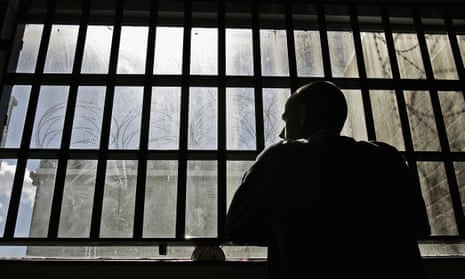The number of punishment hearings held inside prisons has risen by 24% in the past year with almost 160,000 extra days – or 438 years – of imprisonment imposed on inmates, according to a report.
The Howard League for Penal Reform says the record 21,629 disciplinary hearings, known as external adjudications, held in prisons in England and Wales in 2014-15 reflects a growing volatility and violence behind bars.
“The system of adjudications has bloated beyond its originally intended use, which was to punish incidents of unacceptable behaviour. Indeed, in the most out-of-control prisons it has become a routinely used behaviour management technique,” says the report, Punishment in Prison.
The hearings, usually presided over by a prison governor, mainly concern disobedience, disrespect or property offences, which penal reformers say tend to increase as prisons lose control under pressure of overcrowding and staff cuts.
A prisoner found guilty at an adjudication of breaking the rules can face a range of punishments, from the loss of “canteen” – when prisoners can buy extra goods – to solitary confinement or the imposition of extra days in jail.
The most serious cases, which can involve the imposition of up to 42 additional days, may be referred to an external adjudicator such as a visiting district judge but without any legal representation for the prisoner.
Ministry of Justice figures show that the number of these external adjudications has risen by 4,000 or 24% in the past year to 21,629. Nearly half of these external adjudications – 10,119 – led to the imposition of extra days which totalled 159,497 in 2014-15, a 12% increase over the previous year.
Additional days postpone the date on which a prisoner can be released on licence but cannot be added on beyond the end of a sentence.
The official figures show that the number of extra days imposed has been particularly high at Aylesbury young offender institution, where 9,428 extra days were imposed last year on an average population of 418. The next highest was at HMP Rochester, Kent, where 8,048 extra days were handed out to an average of 739 prisoners.
Nine of the 10 prisons that most frequently imposed extra days as punishment hold young offenders. The report says that the use of this form of punishment on children in prison has almost doubled in the past two years, from 1,383 in 2012 to 2,683 in 2014.
The report cites the case of one inmate, James, who was given a three-year prison sentence at the age of 16 for a serious offence. He was difficult and disruptive and had 169 extra days imposed after numerous adjudications for fighting and disobedience. He had been due to be released as a “looked after” child with the full support of social services, but the extra punishment meant he was released as an adult without any support.
The chief executive of the Howard League, Frances Crook, said the system of adjudications had become a monster, imposing fearsome punishments when people misbehave – often as a result of the dreadful conditions they were subjected to.
“This bureaucratic, costly and time-consuming system of punishments then further feeds pressure on the prisons, creating a vicious cycle of troubled prisons and troubling prisoners,” she said.
“The principle of independent adjudication where liberty is at risk is an important one. But prisons have come to rely too heavily on the threat of additional days. The Ministry of Justice should curtail the use of additional days in all but the most serious cases. The overuse of adjudications is not seen as fair, it is not fair, and the imposition of additional days is very expensive and counterproductive.”
The system costs between £400,000 and £500,000 a year to run with the cost of the extra days imposed estimated at £15m.
The prisons minister, Andrew Selous, said when the figures were released in a parliamentary written answer, that disciplinary procedures were central to the maintenance of a safe, custodial environment. “A range of safeguarding measures are in place to make sure that a prisoner or young person is physically and mentally fit to face an adjudication hearing and any subsequent punishment,” he added. “Adjudication outcomes are regularly monitored to make sure that no prisoner or young person is charged or punished for any reason other than their disciplinary behaviour.”
